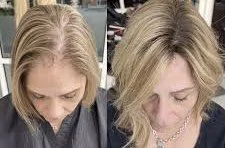The Hair Loss Weight Loss Connection
Hair loss and weight loss are interconnected in several ways, and understanding this connection can help individuals navigate both challenges more effectively.
1. Nutritional Deficiencies: Weight loss, especially when it is rapid or involves restrictive diets, can lead to nutritional deficiencies. Essential vitamins and minerals, such as iron, zinc, and biotin, play crucial roles in hair health. Insufficient intake of these nutrients may result in hair thinning or shedding.
2. Hormonal Changes: Significant weight loss can lead to changes in hormone levels, including fluctuations in estrogen and testosterone. These hormonal changes can trigger hair loss in both men and women, contributing to conditions such as androgenetic alopecia or telogen effluvium.
3. Stress: The process of losing weight can be a source of stress for many individuals. Stress is known to impact hair growth negatively, as it can push hair follicles into a resting phase, leading to increased shedding. Managing stress through mindfulness, exercise, or therapy can be beneficial for maintaining healthy hair.
4. Underlying Health Conditions: Sometimes, weight loss may be a symptom of underlying health issues, such as thyroid disorders or autoimmune diseases. These conditions can also affect hair growth and health. If hair loss occurs alongside unexplained weight loss, it may be advisable to consult a healthcare professional for evaluation.
5. Sudden Changes in Diet or Lifestyle: Rapid changes to diet, whether for weight loss or improved health, can disrupt the body's balance. This includes shifts in metabolism, which can affect hair growth cycles.
Understanding the link between hair loss and weight loss can empower individuals to approach their health holistically. Ensuring a balanced diet rich in nutrients, managing stress levels, and taking a measured approach to weight loss can support both hair health and overall well-being. If you experience significant hair loss while trying to lose weight, consider seeking advice from professionals who specialize in nutrition and hair care.
Toppers, Hair Extensions and Systems for Ozempic Hair
Ozempic and other weightloss drugs have gained recognition for their effectiveness in weight management and blood sugar control, but it's also important to acknowledge the potential side effects they may have on hair health. Many users report experiencing thinning or changes in hair texture, which can be concerning. Here are several strategies to consider for maintaining healthy and beautiful hair while on Ozempic:
1. Nutritional Support:
Prioritize a diet rich in vitamins and minerals that promote hair health. Key nutrients include biotin, zinc, and omega fatty acids. Consulting with a nutritionist can help you tailor your diet to support both weight loss and hair vitality.
2. Gentle Hair Care:
Minimize the use of harsh treatments or styles that can contribute to further thinning. Opt for heat-free styling methods and choose gentle hair care products to protect and nourish your locks.
3. Consult a Professional:
If you notice significant changes in your hair, it’s advisable to discuss these concerns with your healthcare provider or a dermatologist. A professional can help determine the underlying causes and recommend effective interventions.
4. Consider Hair Extensions and Toppers:
For those experiencing noticeable thinning, high-quality hair extensions and Toppers can serve as a temporary solution to enhance volume and length. This can help boost your confidence while you work to address the root causes of hair loss.
As the conversation around medications like Ozempic continues to evolve, being proactive about hair health is crucial. By implementing these strategies, you can help maintain the integrity and beauty of your hair during your weight loss journey...


